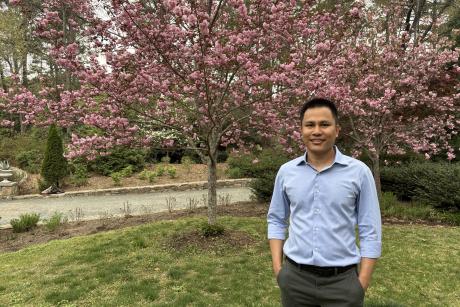
Shanti Narayanasamy started as a fellow with Duke's School of Medicine in 2019, but once the pandemic started, she decided to enroll in DGHI's Master of Science in Global Health Program, taking advantage of her extended stay in the U.S.
Published April 26, 2022, last updated on May 4, 2022 under Alumni Stories
When Shanti Narayanasamy, M.B.B.S, arrived in Durham in August 2019 as an infectious disease fellow at Duke's School of Medicine, she already had an established career. She practiced as an infectious disease physician for more than a decade in her native Australia before taking the step to learn about health from a different perspective.
“I wanted to do an extra clinical year to see what it was like to work in a different context so I came to Duke,” she says. “The decision to come here was fortuitous because people who trained me worked at Duke. And the Global Health Pathway [program] is outstanding.”
Like many, Narayanasamy’s plans changed when COVID-19 spread across the world. She had to hit pause on plans to travel to Vietnam to research the little-known fungal disease talaromycosis. But she found valuable experience as a Global Health Pathway fellow with DGHI's Hubert-Yeargan Center, which included completing the Master of Science in Global Health program.
“The Global Health Pathway and the [MS-GH program] has molded me into a clinician-researcher,” Narayanasamy says. “It gives global perspective, but also shows the structures of how global health operates. There are historical power dynamics in global health, which have colonial roots, and these are important to understand when working in this space."
In her master’s studies, Narayanasamy continued to work with her mentor, associate professor Thuy Le, M.D., Ph.D., to raise awareness of talaromycosis. She also launched her own thesis research exploring the relationship of race and medicine. She was one of four MS-GH students to earn the Dean’s Research Award for Master’s Students from the Duke Graduate School to support her research, which was detailed in a profile by the graduate school.
She says an interest in global health requires an equal interest in equity. Narayanasamy wants to translate her work into change.
“Coming from the Global North, we have an obligation to contribute and help others and do it in different forms, understand their problems and provide solutions,” she says. “There’s differential access to health globally, and I want to be a part of closing that gap.”
Her first step, though, will be to move with her wife and two four-year-olds back to Melbourne, Australia, where eager grandparents are waiting. Narayanasamy admits she hasn’t given much thought to what graduating means to her, noting how COVID-19 changed the student experience for many. Instead, she is focused on what she’s taking with her after the ceremony: remaining committed to work to decolonize global health and someday, giving back to DGHI.
“[The institute] played such an important role in where I am,” she says. “The master’s program completely changed my research focus, and where I would’ve ended up three years ago. That pivot has been amazing.”


